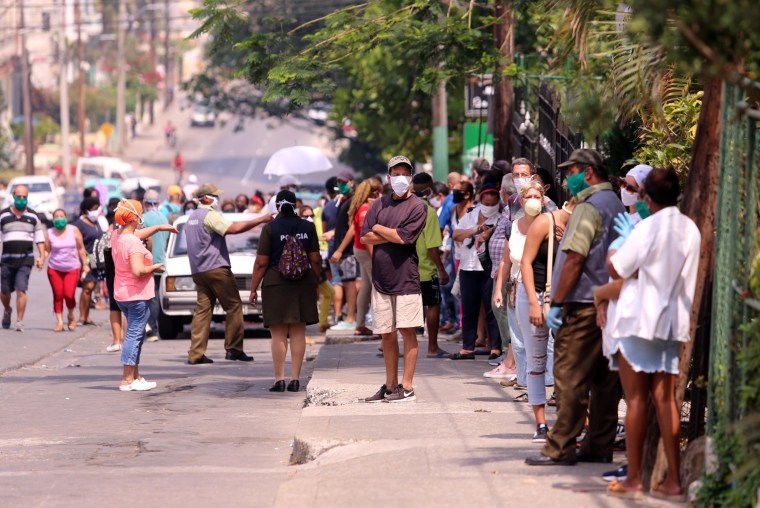HAVANA — When Gilberto heard cooking oil had become available at his neighborhood store, he got on a long line to wait.
Gilberto said he’s busy working as an electrician and does not really have the time to wait on the endless lines that have become customary in Cuba during the coronavirus pandemic.
“It’s difficult. Everything is scarce,” said Gilbert, who spoke on the condition of anonymity and asked that his last name not be used.
He complained that the crowd standing outside the store in Habana del Este, a Havana suburb did not seem to be practicing too much social distancing. Then he quipped, “What people are really afraid of is not finding food, compadre."
As shortages become more acute in the communist-run country, some Cubans fear a return to the Special Period of the 1990s, after the Soviet Union collapsed. The subsidies that Cuba relied heavily on dried up, and the island’s economy shrank by 35 percent. It was a time of extreme deprivation on the island, with people going hungry as diets dwindled and rolling blackouts were common. The Special Period also led to the 1994 rafter crisis, when tens of thousands left in makeshift rafts and boats and headed for the Florida straits.
Cuba’s economy, like other countries around the world, has been hit by the pandemic. The World Bank has projected Latin America’s GDP will contract by 7.2 percent this year. But in Cuba’s case, the economy was already fragile before the pandemic. Pavel Vidal, a former Cuban central bank economist who now teaches at Javeriana University in Colombia, estimates the island’s economy will shrink by about 10 percent this year and perhaps a bit more in 2021.
“The economy is close to a Special Period, but without the blackouts,” said Vidal.
The declines in GDP may not be extended, though, like they were during the Special Period, when the economy dropped 10 to 12 percent each year from 1991 to 1993, Vidal said.
The Cuban government’s most lucrative sources of revenue — the export of medical professionals, followed equally by tourism and remittances — have taken hit after hit over the past couple of years. The Trump administration has tightened the U.S. embargo, limiting travel to the island. In addition, U.S. sanctions on Venezuelan oil has limited the country's ability to export oil to Cuba, which is needed for food production. Various countries, like Brazil, ended their medical program with the Cuban government; and aid from Venezuela, a major ally, has declined amid its economic collapse.
Now, with the coronavirus pandemic, remittances have slowed. Cuba closed its airports, completely shuttering tourism and the ability of Cuban Americans to hand-carry goods to their families. The measure has also put a temporary hold on the underground business of “mulas,” or human mules, who regularly travel between Miami and Cuba, loaded with food, clothes and other goods, to deliver to island relatives for a fee.
Cuban officials say the coronavirus is under control, with less than 12 cases per day. The government has touted its strong health care system for allowing it to maintain relatively low numbers of cases.
The first part of a three-phase plan to gradually reopen the country started Thursday, except for those who live in Havana and the province of Matanzas, where COVID-19 cases have lingered.
Officials also announced limited international tourism to some parts of Cuba.
But even after Cuba reopens to tourism, Vidal projects it will take about 18 to 24 months for the industry to return to its normal levels, based on comparisons to other outbreaks, like Zika and SARS, as well as the fallout from the Sept. 11, 2001, attacks, which limited international travel.
Cuba lacks hard currency to purchase food and other consumer products, like soap and laundry detergent. The island imports over half the food it consumes. The consequence has been widespread shortages in chicken, rice, beans and other foods in state-run stores, as well as crowded lines outside shops when a product does become available.
Cubans still receive basic food at subsidized prices with their ration notebook or “libreta.” Each month they receive 15 eggs, a packet of coffee, rice, sugar and other foods.
The government created online shops, but few items appear there and the internet is not widely available throughout the island. Officials have said they are in the process of restructuring online purchases.
Some Cubans camp out overnight in front of stores, even though the government does not allow it.
Caridad Piedra, 65, says she has to be creative when she prepares food for her family, which include her son, daughter, son-in-law and two grandchildren. Breakfast consists of what they find, whether it’s juice, bread or soy yogurt. They eat a late lunch and then a snack at night.
“We cannot choose. We buy whatever appears in the stores,” Piedra said.
She hopes things don't get worse.
“During the Special Period the only sure food we had was the small daily bread we would receive,” she said.
Orlando Matos reported from Havana, and Carmen Sesin from Miami.
Photos by Roberto Leon.
Follow NBC Latino on Facebook, Twitter and Instagram.


